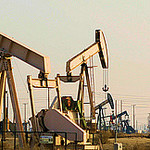
Companies are reportedly using get-rich-quick trade shows and baseless projections of potential future wealth to attract unsuspecting investors—many of them retirees on fixed incomes—to invest in fossil fuels prospecting via “private placement” securities sales. In private placements, a prospecting company, called an “issuer” in this context, hires a broker to administer the sale of a limited number of unregistered securities to small-time investors. The private placement brokers then convince members of the public to invest in the purported exploration project by promising a share of any proceeds if the issuing prospector discovers oil or gas. The broker (working, again, at the behest of the issuer) often attempts to assure prospective investors of the particular project’s legitimacy and promise by claiming that the issuer itself has already committed to investing large sums of money in the endeavor.
According to experts quoted by Reuters, however, most investors in these schemes never make a dime off their investment. In fact, most lose money. This is for a number of reasons: First, investments in oil and gas exploration are infamously high-risk due to the highly speculative nature of the practice as well as a long history of intense exploitation of the more promising prospect grounds. In addition to this inherent risk, however, private placements are often rigged to favor the issuer and deprive the investor of some or all of his or her investment. Private placement brokers and issuers are poorly regulated, as the U.S. Securities and Exchange Commission (“SEC”)—the federal agency responsible for regulating such ventures—only mandates that private placement purveyors file sparse registration documents, after which there is no required follow-up reporting. The Financial Industry Regulatory Authority (“FINRA”), the industry’s self-regulating entity, does require that brokers of private placements perform due diligence of sales they’re considering brokering. However, these brokers frequently hire outside firms to perform this due diligence, and these firms are often funded by the issuers themselves—that is, by the same prospectors the firms are theoretically investigating to ensure legitimacy for the protection of future investors.
Additionally, Reuters reports that the money oil and gas exploration issuers themselves claim to invest into their own projects—a key point brokers may emphasize to potential investors to inspire confidence prior to completing a sale—are often funneled back to the issuer by marking up the cost of equipment purchases and “hiring” affiliated entities to perform services related to the prospecting. Reuters also reports that brokers take home a standard 10 percent commission on all investments they sell, further shrinking the stream of investor funds that ultimately contribute to a project’s on-the-ground operations (and decreasing the exploration’s likelihood of success accordingly). Lastly, investors are generally stuck with their holdings when they fail to yield dividends, as there is no active secondary market for oil-and-gas private placement securities, and issuers know better than to buy them back themselves.
Between generous government subsidies and the promise of new discoveries through fracking, these are boom times for oil-and-gas private placements: According to Reuters, roughly 4,000 such ventures since 2008 have sought to raise more than $120 billion. The sobering truth, however, is that investors in oil-and-gas private placements usually lose money. Reuters’ examination of two active private placement issuers illustrates this reality: The report revealed that investors in the first issuer, Atlas Energy LP of Pennsylvania, lost money in 29 of 43 private placements Atlas has issued over the past three decades. The second issuer, Reef Oil & Gas of Texas, failed to return a profit to its investors in 22 of 34 placements since 1996. The brokers and issuers, meanwhile, may still profit even when they don’t sell a single barrel of oil or cubic foot of natural gas from a project—meaning investors will lose most or all of their money—by pocketing investor funds, either directly or via affiliates, through the various diversions described above.
While not all oil-and-gas private placements necessarily involve these practices, the specter of partial or total loss of investment in such ventures is so great that the SEC took the unusual step last year of issuing an alert to investors warning them of the “unique” and “additional” risks involved. The Commission emphasized that investors in oil-and-gas private placements are particularly vulnerable to being defrauded, noting that both the agency and analogous state regulators had registered a marked increase in fraud prosecutions since 2005. However, problems remain even after a private placement scheme has been identified as fraudulent and held liable in civil court, as harmed investors often struggle to collect on judgments from brokerage firms. Many firms, lacking insurance and maintaining inadequate funds to cover their legal debts, choose to file for bankruptcy protection rather than compensate those they’ve victimized, and the brokers themselves simply move to or establish a new firm in a practice appropriately referred to as “cockroaching.”
Challenges aside, Cotchett, Pitre & McCarthy, LLP has successfully represented investors who lost substantial sums of money through suspect oil-and-gas private placements: In 2013, CPM partner Matt Edling represented a group of harmed investors related to five oil and gas offering against Pacific West Securities. The case eventually went to arbitration before a FINRA panel, which unanimously ruled in favor of CPM’s clients and issued a nearly $6 million award. The U.S. District Court for the Northern District of California approved the arbitration award in April 2013.
CPM remains involved in the private enforcement of oil-and-gas private placement fraud. To learn more about this issue or CPM’s experience in these matters, or to report a suspected case of fraud, contact Matt Edling at (650) 697-6000.
